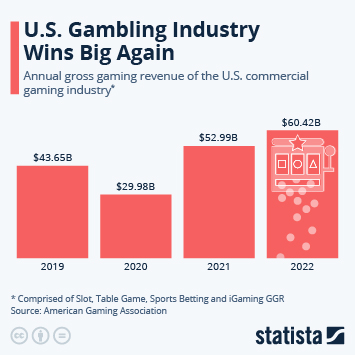The Gambling Industry is a multifaceted realm that has long intrigued people around the globe. With its rich history dating back centuries, it intertwines traditions, economies, and culture like few other industries can. For instance, in Macau, the staggering gambling revenues surpass even the most famous gambling capitals, showcasing its significance in the global market. Additionally, innovations in slot machine technology continue to revolutionize the gaming experience, transforming how players engage with these popular devices. The cultural impact of casinos cannot be overlooked, as they serve as hubs of entertainment and economic growth, shaping local communities and economies in profound ways.
Exploring the world of wagering reveals a tapestry of facts and insights that highlight its expansive reach. The gaming sector, often interchanged with terms such as the betting industry or gaming entertainment, has evolved significantly over time. From landmark innovations in gaming machines that enhance player enjoyment to the astonishing financial figures generated by gambling hubs, the industry is steeped in fascinating developments. Furthermore, the cultural significance of betting establishments reflects their role as pivotal contributors to local economies and social structures. Understanding these aspects offers a deeper appreciation for the gambling landscape and its broader implications in society.
Gambling Industry Facts: A Deep Dive into Casino History
The gambling industry boasts a rich and captivating history that dates back centuries and intricately ties itself to societal evolution. One of the most intriguing aspects of this history is the establishment of casinos in places you would least expect, including prisons. For instance, Nevada State Prison operated its casino between 1932 and 1967, allowing inmates to engage in betting activities that reflect the broader cultural acceptance of gambling in American society. This unusual intersection reveals how deeply entrenched the gambling ethos has become, serving as a storytelling medium that binds together themes of risk, reward, and redemption.
As time progressed, gambling practices have consistently evolved, introducing new games and technologies that captivate players’ imaginations. The innovations in casino gaming, from the early days of card games to the introduction of electronic slot machines, serve as testament to the industry’s adaptive nature. With every significant leap in technology, from mechanical slots to online gaming platforms, gambling has reflected societal changes and consumer preferences, establishing itself as a cultural cornerstone that continues to enchant millions.
The Financial Impact of Gambling: Macau’s Global Dominance
Macau has solidified its reputation as the largest gambling hub in the world, dwarfing other internationally recognized locales like Las Vegas. In recent years, Macau’s gambling revenues have reached staggering heights, particularly evident in 2016 when the city reported earnings exceeding $45 billion. This jaw-dropping figure underscores the financial scale of the gambling industry and its crucial role in the global economy. Beyond just numbers, the economic activity generated by casinos in Macau fosters job creation and contributes significantly to public services, affirming that the gambling industry is a vital pillar of its local economy.
However, the economic implications of such revenues extend far beyond the surface level, prompting discussions about sustainability and regulatory practices. As the gambling industry in Macau flourishes, the government also faces the challenge of regulating its operations to prevent potential exploitation and to ensure a healthy environment for players. The blend of immense wealth generation and regulatory oversight paints a complex picture of the gambling industry in Macau, illustrating how intertwined economics and entertainment can shape societal structure.
Frequently Asked Questions
What are some historical facts about gambling in the casino industry?
The casino industry has a rich history, with one remarkable fact being the operation of a casino within Nevada State Prison from 1932 to 1967. This unique situation highlighted the deep roots of gambling in American culture, showing how even inmates engaged with casino games like blackjack and poker, illustrating the widespread appeal of gambling throughout history.
How does Macau’s gambling revenue reflect the global gambling industry?
Macau has made headlines for its impressive gambling revenues, which surpassed $45 billion in 2016, establishing it as the world’s largest gambling capital. This immense financial scale illustrates the significance of the gambling industry, as Macau’s casinos not only drive local economic growth but also set benchmarks for success in gaming operations globally.
| Key Aspect | Description |
|---|---|
| Historical Aspects: Incarcerated Gamblers | A casino operated in Nevada State Prison from 1932 until 1967, showcasing the deep cultural roots of gambling in America. |
| Financial Scale: The Macau Phenomenon | In 2016, Macau generated over $45 billion in gambling revenues, establishing it as the world’s largest gambling hub. |
| Innovations in Gaming: The Birth of Slot Machines | Originally designed for entertainment, slot machines evolved into a multi-billion dollar segment, reflecting innovation in casinos. |
| Interesting Milestones: Jaw-Dropping Payouts | A record payout of €17.86 million was won from a 25-cent bet in 2013, exemplifying the thrill of gambling. |
| Cultural Impact: Casinos as Community Drivers | Casinos are vital to local economies, providing jobs, cultural engagement, and shaping community dynamics in gambling hotspots. |
| Regulatory Framework: Keeping the Industry in Check | Regulations ensure fair play and responsible gaming, protecting both players and operators. |
| Future Trends: The Rise of Online Gambling | Online gambling has surged, accelerated by COVID-19, transforming how people engage with gaming. |
Summary
Gambling Industry Facts reveal the intriguing, multifaceted nature of this widespread activity. The gambling industry is not just about the thrill of winning; it’s a significant economic force that intertwines with cultural and social dynamics. From its historical roots in unique venues like Nevada State Prison, the financial behemoth that is Macau, to innovative products like slot machines and the rapid growth of online gambling, it profoundly shapes communities and individual experiences alike. As we navigate the complexities of gambling’s impact, it remains essential to understand its potential benefits and challenges, ensuring a responsible approach to this pervasive aspect of entertainment.
